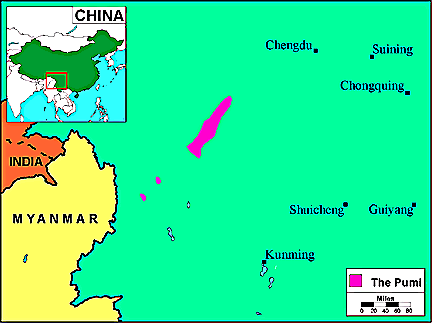|
|
Prayer Profile
The Pumi of China
![[IMAGE]](../images5/0840.jpg) More than 30,000 Pumi live in the high mountains of the northwestern corner of China's southern Yunnan province. They are one of the smallest of China's 55 officially recognized ethnic minority groups. Their language, also called Pumi, belongs to the Sino-Tibetan language family. They once used a Tibetan script, but gradually converted to the Chinese writing system.
More than 30,000 Pumi live in the high mountains of the northwestern corner of China's southern Yunnan province. They are one of the smallest of China's 55 officially recognized ethnic minority groups. Their language, also called Pumi, belongs to the Sino-Tibetan language family. They once used a Tibetan script, but gradually converted to the Chinese writing system.
The ancestors of the Pumi were nomads of the Tibetan Plateau. Over 1,000 years ago, they left the cold, isolated highlands and moved to Sichuan in search of a warmer, more temperate climate. By the fourteenth century, they had migrated to Yunnan, where they have remained to this day.
Until recent decades, the Pumi lived very primitive lives and were virtually untouched by modern development. After the 1949 Communist revolution and the abolishment of the feudal system, their standard of living improved somewhat.
What Are Their Lives Like?
Most of the Pumi earn a living through agriculture. Their farms are located on hillsides at elevations of up to 2,500 meters. The main crops grown are maize (their staple food), rice, wheat, and highland barley. Popular fruits and vegetables include cabbage, carrots, eggplants, and melons. The Pumi also raise bees and many types of animals, including cattle, sheep, poultry, and pigs.
Pumi villages are located on sunny hillsides. The houses are made of logs and the roofs constructed of wooden boards. The houses have two stories, with the bottom floor being used for storage and as a shelter for the animals. The family lives on the top story. The fireplace is located at the center of the top floor and is the center of family activity.
The Pumi women wear unique native clothing that varies from region to region. In some areas, they wear vests over jackets that are buttoned down one side and pleated, tubular skirts. In other regions, the women wear short coats with pants rather than skirts. Nearly all Pumi women wear earrings, necklaces, bracelets, and rings, and the majority wear long sheepskin coats over their shoulders. The most distinguishing feature of their dress, is the large turbans they wear on their heads. When unwrapped, the turbans are four meters long.
Pumi marriages are monogamous, (made up of one man and one woman). Most marriages are arranged by parents, and in the past, marriages were often arranged when the couple-to-be were children. Pumi marriage ceremonies include singing, dancing, and feasting.
What Are Their Beliefs?
Traditionally, the Pumi practiced Lamaistic Buddhism, also known as Tibetan Buddhism. However, they have retained many of their non-Buddhist rituals and superstitions. For example, they venerate their deceased ancestors and believe that certain spirits watch over their homes.
Buddhism teaches that human life is a continuous cycle of death and rebirth, a doctrine called "reincarnation." By following the teachings of Buddhism, a person may break free of the cycle and reach nirvana, a state of eternal bliss and peace. Buddhism stresses knowledge of truth, respect of life, self-denial, and meditation. The religion is divided into a variety of sects, one of which is Tibetan Buddhism, a combination of orthodox Buddhism and traditional Tibetan rituals.
What Are Their Needs?
The lives of the Pumi have improved substantially in recent years, but they still live as poor farmers who struggle to earn a living. More recently, China has witnessed dramatic economic development, but much of the new investment is in the major cities and focused on industry and trade. In the outlying areas, progress has been slow and the lifestyle of the villagers has changed little. Many people live without electricity, running water, and have proper health care facilities. In addition, as with all people groups in China, their lives are strictly governed by the repressive Communist government.
Prayer Points
- Ask the Lord of the harvest to send forth laborers into China to share Christ with the Pumi.
- Pray that God will reveal Himself to the Pumi through dreams and visions.
- Pray that God will give the Pumi believers boldness to share Christ with their people.
- Take authority over the spiritual principalities and powers that are keeping the Pumi bound in their traditional belief system.
- Ask God to raise up prayer teams who will begin breaking up the soil through intercession.
- Ask the Lord to bring forth a triumphant Pumi church for the glory of His name!
- Pray that Christian radio broadcasts, evangelical literature, and the Jesus film will be made available to the Pumi.
- Ask the Lord to save key leaders among the Pumi who will boldly declare the Gospel.

Statistics
Latest estimates from the World Evangelization Research Center.
THE PEOPLE
- People name: Pumi
- Country: China
- Their language: primmi (pumi)
- Population:
- Largest religion:
- Christians: <1%
- Church members: 63
- Scriptures in their own language: None
- Jesus Film in their own language: None
- Christian broadcasts in their own language: None
- Mission agencies working among this people: 0
- Persons who have heard the Gospel: 3,800 (13%)
- Persons who have never heard the Gospel: 27,600 (87%)
THEIR COUNTRY
- Country: China
- Population:
- Major peoples in size order:
- Major religions:
- Number of denominations: 42
© Copyright 1997
Bethany World Prayer Center
This profile may be copied and distributed without obtaining permission
as long as it is not altered, bound, published
or used for profit purposes.
![[HOME BUTTON]](../graphics/home.jpg)
![[CALENDAR BUTTON]](../graphics/calico.jpg)
![[LIST BUTTON]](../graphics/listico.jpg)
[Home]
[Calendar]
[Country List]
|